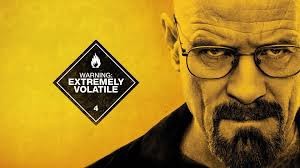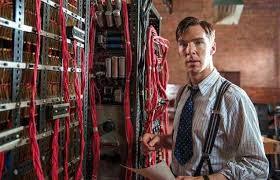Tell Us What Your Story is About
[Continuing our series on Theme in fiction, nonfiction, and movies … ]
I’m a big fan of Blake Snyder. If you haven’t read Save the Cat! and Save the Cat! Goes to the Movies, please rectify that oversight at once.

Bryan Cranston in “Breaking Bad.” The theme is transformation.
One of Blake’s lasting legacies (he died tragically in 2009 at age fifty-one) is what he called BS2, the Blake Snyder Beat Sheet.
The beat sheet is an all-purpose template for writing a screenplay. It breaks down a movie story into fifteen structural beats, e.g. Catalyst, Debate, Break Into Two, Midpoint, All Is Lost, etc.
Number Three, following “Opening Image” and “Setup” is “Theme Stated.”
Here’s what Blake writes in Save the Cat!
Somewhere in the first five minutes of a well-structured screenplay, someone (usually not the main character) will pose a question or make a statement (usually to the main character) that is the theme of the movie. “Be careful what you wish for,” this person will say or “Pride goeth before a fall” or “Family is more important than money.” It won’t be this obvious, it will be conversational, an offhand remark that the main character doesn’t quite get at the moment—but which will have far-reaching and meaningful impact later.
This statement is the movie’s thematic premise.
In When Harry Met Sally, Harry (Billy Crystal) declares right at the top, “It’s impossible for a man and a woman to be friends.” That’s the question. That’s the theme.
The theme of The Imitation Game is stated (the first of three times, each by a different character) first to the protagonist, young Alan Turing (Benedict Cumberbatch), by his best friend and lover Christopher (Jack Bannon) while they’re still schoolboys:
Sometimes it is the people whom no one imagines anything of who do the things that no one can imagine.
That’s a bit “on the nose,” I admit. But it’s the theme (or at least one of them.)

Benedict Cumberbatch as Alan Turing in “The Imitation Game.”
Did you see the pilot for Breaking Bad?
Even if you’ve never watched the series you probably know it’s about mild-mannered high school chemistry teacher Walter White (Bryan Cranston) who gets a diagnosis of inoperable cancer and, to make money to care for his family, embarks upon a life of crime, mainly cooking and dealing methamphetamine, while going farther and farther off the map to become the baddest of the bad, bad, bad guys.
What’s the theme? Did series creator Vince Gilligan state it anywhere, as Blake Snyder suggests?
Indeed there’s a scene right off the bat, while Mr. White is still a law-abiding chem teacher. In class he asks his students, “What is chemistry about?” Several kids offer lame answers. Then our protagonist answers the question himself.
WALTER WHITE
Change. Chemistry is the study of change. Elements combine and change into compounds. That’s all of life, right? Solution, dissolution. Growth. Decay. Transformation. It’s fascinating, really.
This speech is not up front in the pilot by accident. It’s Vince Gilligan’s statement of the series’ theme—transformation.
Here’s more from Blake Snyder:
In many ways a good screenplay is an argument posed by the screenwriter, the pros and cons of living a particular kind of life or pursuing a particular goal. Is a behavior, dream, or goal worth it? What is more important, wealth or happiness? Who is greater in the overall scheme of things—the individual or the group? And the rest of the screenplay is the argument laid out … Whether you’re writing a comedy, a drama, or a sci-fi monster picture, a good movie has to be “about something.” And the place to stick what your movie is about is right up front. Say it! Out loud. Right there.
If you don’t have a movie that’s about something, you’re in trouble. Strive to figure out what you’re trying to say. Maybe you won’t know until the first draft is done. But once you do know, be certain that the subject is raised right up front—page 5 is where I always put it.
But make sure it’s there. It’s your opening bid.
Declare: I can prove it. Then set out to do so.
My own opinion is that, though it’s a neat trick if you can state the theme up front, it’s not imperative. Most of the time the statement goes over everybody’s head except crazed film or fiction buffs anyway.
But what is critically important is that we as writers know the theme ourselves. We should have identified it and be able to articulate it, not vaguely but spot-on. Why? Because we’re the architects of our novel or movie. We have to know the foundation.
Remember Paddy Chayefsky’s axiom:
As soon as I figure out the theme of my play, I type it out in a single sentence and Scotch-tape it to the front of my typewriter. After that, nothing goes into that play that is not on-theme.



